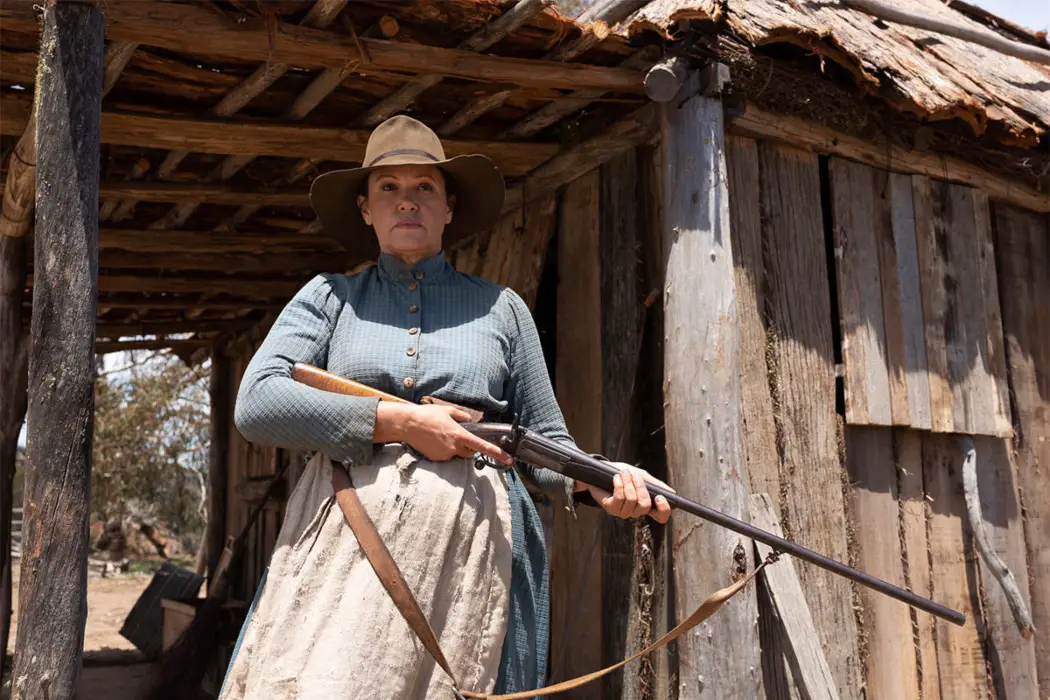CinefestOz 2021: THE DROVER’S WIFE: THE LEGEND OF MOLLY JOHNSON

Alex is a 28 year-old West Australian who has a…
There’s a hint of Quentin Tarantino to The Drover’s Wife: The Legend of Molly Johnson, but not in the ways that one may expect from Indigenous actor-filmmaker Leah Purcell‘s mud-soaked adaptation of Henry Lawson‘s 1892 short story. As CinefestOz’s opening film – unspooling its world-first theatrical screening after SXSW and MIFF premieres were cancelled earlier this year – Purcell‘s western is her third rendition of this elemental tale, which originated as an award-winning book, then an equally-celebrated play (which advertised itself as “Tarantino meets Henry Lawson”) and seems to run parallel to Tarantino‘s on-going expansion of his most recent hit Once Upon a Time in Hollywood, which has unfurled in reverse (movie-book-theatre).
Purcell‘s artistic fixation on this determined woman’s struggle against nature’s perils seems to accommodate the same appeal that has enraptured Tarantino to stay within his own fictional 70’s Hollywood landscape: the chance to rewrite historical injustices through art. These narratives allow their creators to retroactively bring retribution to those who escaped their rightful punishments – and address those who suffered instead. Molly Johnson may be a fabrication but the adversity and hardship that she endures and is witness to represents the smeared stains on Australia’s national history, with a strong emphasis on the trauma inflicted against Indigenous and female bodies.

Get Off My Lawn
In the midst of the New South Wales’ Snowy Mountains region lies the humble outback shack of Molly Johnson (Purcell), a dusty stage that hosts a parade of unwelcome visitors whilst her drunken husband is away droving sheep. The first tourist to contend with the heavily pregnant mother of four’s trigger-happy handshakes (whether it’s cow or man, everybody is welcomed with the business end of her rifle) is the lantern-jawed Sgt. Nate Clintoff (Sam Reid), an English import who have been assigned the law duties of the still-developing town of Everton, a place where his ill wife Louisa (Jessica De Gouw) hopes to start a defiant feminist newspaper (one of many anachronistic particulars that mutually enlivens and distracts).
After pleasant introductions and a warm meal, the two finally depart, but it is not long before another guest, a branded Aboriginal fugitive named Yadaka (a charismatic Rob Collins) appears face-down at Molly’s doorstep. Her paranoid apprehension is shakily dispelled when she starts to give birth and the wanted criminal is the only one around to lend a hand. An uneasy bond is formed between the two, and as Clintoff is tasked with tracking down the missing fugitive, ancestral lineages are uncovered (including ill-conceived flashbacks to Johnson’s mother) and bodies start piling up towards an inevitable end.
Return of the Western
Purcell‘s cultural reckoning with Australia’s sordid legacy is one of many recent Australian Westerns to use the genre to tackle modern social issues through their ugly historical foundations; Sweet Country, The Nightingale, High Ground, and The Furnace have each contributed to this new wave of grim, furious dramas that foreground Indigenous characters in place of the traditional white-washed tales that have been the dominant narrative for decades in the media. Comparisons to Clint Eastwood aren’t surface-level connections as the stoic gun-wielding sinner that is forced to fight back against a truly evil force that threatens their domestic spaces is a staple formula, but The Drover’s Wife carefully positions itself within the fading light of the Old West and towards the birth of a new generation in ways that thematically call back to Unforgiven and other generational influences like Delmer Daves‘ The Hanging Tree.

This cultural transition is best seen within the fractured community of Everton – which, like its inhabitants, is trapped in a rugged cycle of life and death – where new concepts like the female-led newspaper and fines for public drunkenness look to replace ingrained social ideas of crude vigilantism, male authority and unspoken lives of “battered wives”. Louisa’s journalistic aspirations are one of the many ideas that eventually congest this relatively simple premise, and the culmination of all these subversive suggestions – which sadly sticks closer to archival truth than the conventional gratification that you’d expect with such an audacious title – is bound to disappoint general audiences.
Conclusion
Despite her familiarity with Johnson’s isolated world, Leah Purcell‘s undeniable passion for The Drover’s Wife: The Legend of Molly Johnson ultimately does her directing debut a massive disservice. The final product is a melodramatically overwrought and narratively undercooked tragedy that episodically lumbers between an array of impassive characters whose individual issues take away from the titular legend’s own plight, including eschewing massive emotional moments that removes their intended poignancy.
What do you think of the recent wave of revisionist Australian Westerns? Leave a comment for the Film Inquiry Community and keep the conversation going.
The Drover’s Wife The Legend of Molly Johnson played in competition at CinefestOZ 2021, before a planned Australian theatrical release on May 5, 2022.
Does content like this matter to you?
Become a Member and support film journalism. Unlock access to all of Film Inquiry`s great articles. Join a community of like-minded readers who are passionate about cinema - get access to our private members Network, give back to independent filmmakers, and more.













